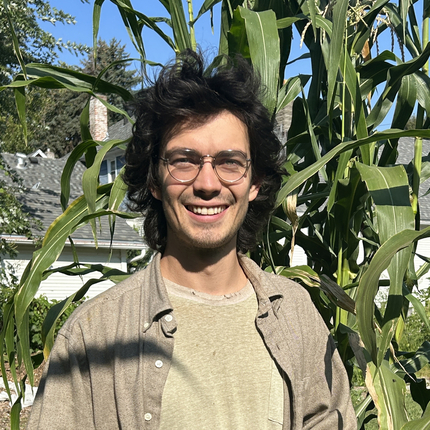In our second highest viewed post of 2023, we feature one of our Beginning Farmer Conservation Fellows. A group of eight work to incorporate conservation methods with a final project.
James Keeley works on Big Muddy Urban Farm, in Omaha, and now lives out his agricultural and lifestyle goals every day. James’ project involves creating habitats for bats within the city, and specifically locating them in urban garden settings. This piece is authored by Liz Stewart, and was posted in September.
Conservation fellow cares for community, nurtures living things
By Liz Stewart. Cait Caughey contributed to this story.
When James Keeley started farming, all he knew was what he learned gardening in the backyard with his mom. But his limited knowledge didn’t stop him from making agriculture his main focus in life.
The COVID-19 pandemic hit just as he graduated from college, and he decided to move from his hometown of Omaha to California to work on an organic vegetable farm in the Sierra Nevada mountain range.
The life he created for himself there changed his outlook on agriculture, and it set him up with the skills and experience he needed for the next step in his agricultural adventure.
“I found that I really enjoyed the lifestyle that came with the work: spending so much time outside, paying close attention to the weather and seasons, and caring and nurturing living things,” James said. “From then on I decided even if it is not something I am doing for a living, it is a lifestyle I have adopted and plan to continue honing throughout life.”
He moved back to Omaha and now lives out his agricultural and lifestyle goals every day, farming at Big Muddy Urban Farm in the Gifford Park neighborhood. This urban farm consists of five plots of land on vacant neighborhood lots. James and other farmers like him work to provide a 40-person Community Supported Agriculture (CSA) program where members receive vegetables, herbs, and eggs for 18 weeks.
Big Muddy Urban Farm functions as an educational nonprofit to provide a season-long learning experience for live-in farm residents, like James. The farm offers the Center for Rural Affairs Beginning Farmer Conservation Fellowship Program as an additional option for first-year residents to help round out their farm experience and focus on how to implement conservation practices in an urban farming setting.
The Beginning Farmer Conservation Fellowship began in 2022 with eight individuals, plus mentors. The second cohort of the Beginning Farmer Conservation Fellowship Program began in February 2023 with eight beginning farmers, including James.
“I think conservation education naturally aids a beginner farmer in learning the functions around a garden rather than learning to force practices upon a garden or growing space,” James said. “Learning to act as a partner in growing as it relates to natural resources rather than the sole authority of how things should grow is a great foundation for a beginner farmer.”
James is using his conservation skills to grow diversified vegetables and raise more than 30 egg-laying hens in the Gifford Park neighborhood.
“I was really happy with our cucumbers," he said. “We got a lot of production out of them this year. Our kale has been strong and we have been able to include it regularly in our CSA each week. We have also had hundreds of pounds of patty pan squash.”
Conservation fellows also design and implement a conservation project on their own farms or land they are farming. They present their findings at a farm tour to their mentors, project partners, and other beginning farmers.
James’ project involves creating habitats for bats within the city, and specifically locating them in urban garden settings. He plans to build a number of bat boxes and place them in the Big Muddy Farm plots as well as in plots at Free Farm Syndicate, another Omaha urban farming project. He will then keep track and collect data on insect populations in the plots to better understand how the bat habitats affect it, and also note the bat populations at each location.
“Bats function as pollinators and also contribute to keeping insect populations balanced in the garden,” James said. “Gifford Park currently has a huge bat population in part due to the bat release every year that happens nearby. To protect these important species from getting trapped or hurt moving in and out of people’s houses is another reason why I wanted to put up these houses.”
Outside of the fellowship program, James’ goal, if he has access to land, is to always try to grow vegetables, flowers, and herbs for himself and for the people around him.
He also contributes to his community as much as possible, in part by farming with other organizations that grow on vacant neighborhood lots throughout the city.
“All of the produce grown on these lots is then given away for free at neighborhood stands,” he said. “I appreciate the communal aspects of working alongside like-minded people who care for those in their community. It’s important to look out for your neighbor, be kind.”
The program is hosted by the Center for Rural Affairs along with project partners Nebraska Sustainable Agriculture Society, Big Muddy Urban Farm, and Metro Community College.
Stay tuned for future updates on the Beginning Farmer Conservation Fellowship and mentorship opportunities? More information can be found at cfra.org/beginning-farmer-conservation-fellowship-program.
The Beginning Farmer Conservation Fellowship is a program of the United States Department of Agriculture Natural Resources Conservation Service under agreement number NR223A750003C004 Conservation Outreach: Equity Conservation Cooperative Agreements.





